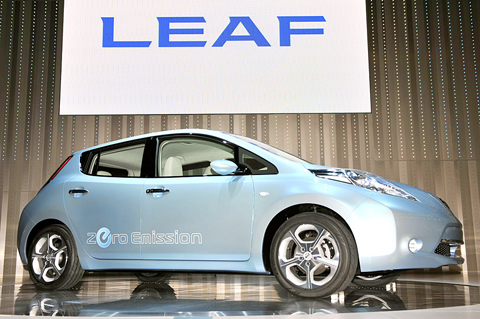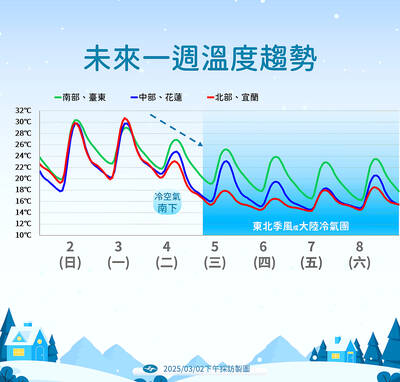Nissan yesterday unveiled its first all electric car, the Leaf, vowing to open a new chapter for the troubled auto industry and take a lead over its bigger rivals in “green” vehicles.
The mid-sized hatchback, which will go on sale late next year in Japan, the US and Europe, represents a bold bet by Nissan that hybrids are merely a passing fad on the road to pure electric vehicles.
The Leaf, described by Nissan as “the world’s first affordable, zero-emission car,” can travel more than 160km on a single charge at a top speed of 140kph, the company said.

PHOTO: BLOOMBERG
It will “lead the way to a zero-emission future, opening a new era in the automotive industry,” CEO Carlos Ghosn said, unveiling the car at the group’s new headquarters in Yokohama, southwest of Tokyo.
“The Leaf is totally neutral to the environment: There is no exhaust pipe, no gasoline-burning engine. There is only the quiet, efficient power provided by our own lithium-ion battery packs,” he said.
The price was not announced but Ghosn said it would be “very competitive.”
Nissan plans to sell the car at a similar price to a comparable model with a petrol-powered engine. The battery, which will be stored under the seat and floor, will be leased separately.
“The monthly cost of the battery, plus the electric charge, will be less than the cost of gasoline,” Ghosn said.
Owners will be able to recharge the battery at home through the domestic power supply in about eight hours, or top it up to 80 percent capacity in around 30 minutes at planned electric recharging stations, it said.
Among other features, users will be able to use their cellphones to turn on the air conditioning and set the battery-charging functions.
If they need help finding the nearest charging station, the navigation system will point the way.
Nissan, Japan’s third-largest automaker, was slower than Toyota and Honda to embrace fuel-sipping petrol-electric hybrids, but it is determined to steal a march on its larger competitors in electric cars.
The dream of an electric car has so far failed to break into the mainstream because of limited battery life and high costs.
But after technological breakthroughs in the development of lithium-ion batteries, soon it may not just be Hollywood stars who are zipping around in electric cars.
Nissan sees a mass, not niche, market for electric cars, Ghosn said.
“Hybrids are not mass market. They represent 2 percent of the global market after many years,” he said.
The stakes are high for Nissan, which lost about US$2.5 billion in the year to March and is slashing 20,000 jobs.
“We need to invest a lot of money to build the car plants and the battery plants at a moment where all the auto companies are saving investments,” Ghosn said. “But there is such a high potential that we [will] go ahead with it.”
The Japanese maker, which is 44 percent owned by France’s Renault, plans to produce the Leaf in Japan and the US and manufacture some of the batteries at plants in Britain and Portugal.
The carmaker has signed agreements with various governments including Israel, Portugal and Singapore, as well as communities in Japan and the US to set up electric recharging stations.
The Leaf will not be the first electric car on the market. Mitsubishi Motors recently rolled out its “i-MiEV” minicar, while Fuji Heavy Industries launched the Subaru Plug-in STELLA.
Meanwhile, in other developments, Mitsubishi UFJ Financial Group (MUFJ) has put together a syndicated loan worth US$5 billion for a sovereign wealth fund in Abu Dhabi, a report said yesterday.
Bank of Tokyo-Mitsubishi UFJ, part of the MUFJ group, has arranged the multi-bank credit for International Petroleum Investment Co (IPIC), the business daily Nikkei Shimbun reported, without citing sources.
The syndicate also involves 15 other banks, including Santander of Spain, HSBC Holdings Plc of Britain and Sumitomo Mitsui Banking Corp of Japan, the report said.
Japanese banks are hoping to increase their presence in the Middle East, the Nikkei said, adding that many Middle Eastern sovereign wealth funds need large loans, which major US and European banks have grown cautious about providing.
IPIC will most likely use the loan to acquire Canada-based Nova Chemicals Corp and take a stake in CEPSA, Spain’s No. 2 oil company, the Nikkei said.

SECURITY: The purpose for giving Hong Kong and Macau residents more lenient paths to permanent residency no longer applies due to China’s policies, a source said The government is considering removing an optional path to citizenship for residents from Hong Kong and Macau, and lengthening the terms for permanent residence eligibility, a source said yesterday. In a bid to prevent the Chinese Communist Party (CCP) from infiltrating Taiwan through immigration from Hong Kong and Macau, the government could amend immigration laws for residents of the territories who currently receive preferential treatment, an official familiar with the matter speaking on condition of anonymity said. The move was part of “national security-related legislative reform,” they added. Under the amendments, arrivals from the Chinese territories would have to reside in Taiwan for

CRITICAL MOVE: TSMC’s plan to invest another US$100 billion in US chipmaking would boost Taiwan’s competitive edge in the global market, the premier said The government would ensure that the most advanced chipmaking technology stays in Taiwan while assisting Taiwan Semiconductor Manufacturing Co (TSMC, 台積電) in investing overseas, the Presidential Office said yesterday. The statement follows a joint announcement by the world’s largest contract chipmaker and US President Donald Trump on Monday that TSMC would invest an additional US$100 billion over the next four years to expand its semiconductor manufacturing operations in the US, which would include construction of three new chip fabrication plants, two advanced packaging facilities, and a research and development center. The government knew about the deal in advance and would assist, Presidential

‘DANGEROUS GAME’: Legislative Yuan budget cuts have already become a point of discussion for Democrats and Republicans in Washington, Elbridge Colby said Taiwan’s fall to China “would be a disaster for American interests” and Taipei must raise defense spending to deter Beijing, US President Donald Trump’s pick to lead Pentagon policy, Elbridge Colby, said on Tuesday during his US Senate confirmation hearing. The nominee for US undersecretary of defense for policy told the Armed Services Committee that Washington needs to motivate Taiwan to avoid a conflict with China and that he is “profoundly disturbed” about its perceived reluctance to raise defense spending closer to 10 percent of GDP. Colby, a China hawk who also served in the Pentagon in Trump’s first team,

The arrival of a cold front tomorrow could plunge temperatures into the mid-teens, the Central Weather Administration (CWA) said. Temperatures yesterday rose to 28°C to 30°C in northern and eastern Taiwan, and 32°C to 33°C in central and southern Taiwan, CWA data showed. Similar but mostly cloudy weather is expected today, the CWA said. However, the arrival of a cold air mass tomorrow would cause a rapid drop in temperatures to 15°C cooler than the previous day’s highs. The cold front, which is expected to last through the weekend, would bring steady rainfall tomorrow, along with multiple waves of showers